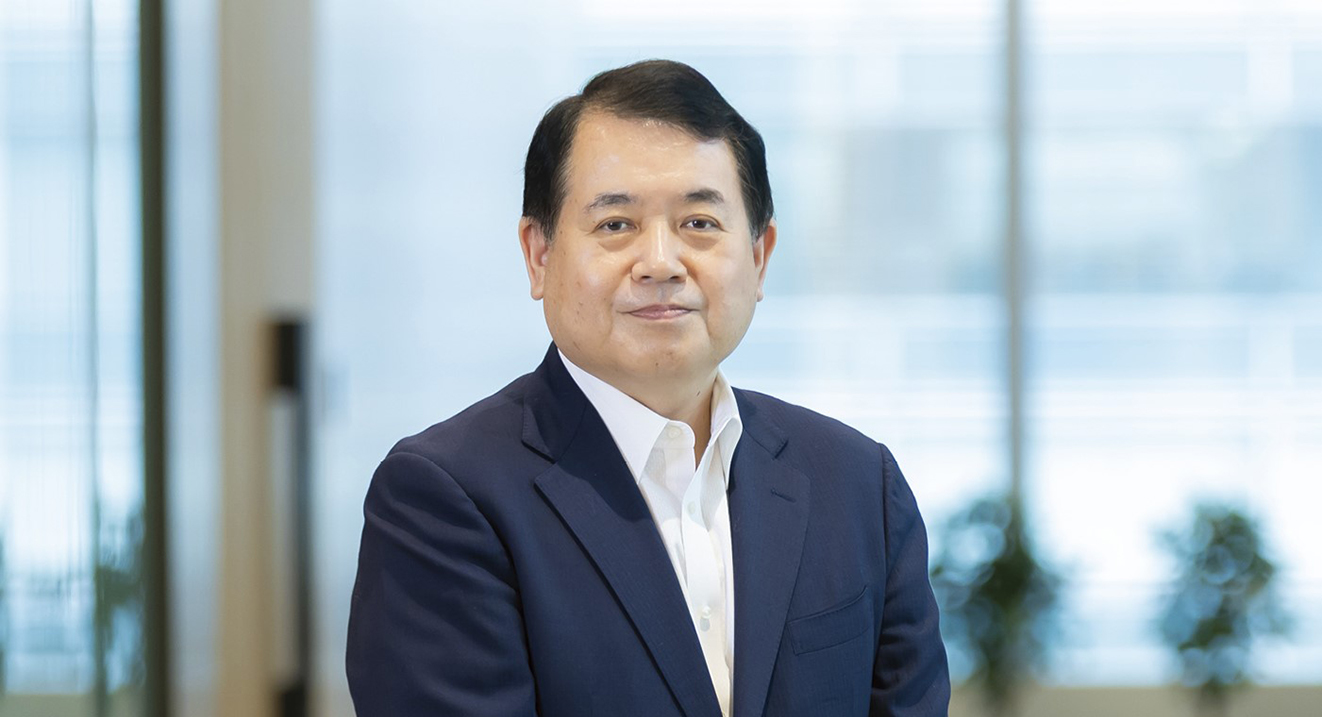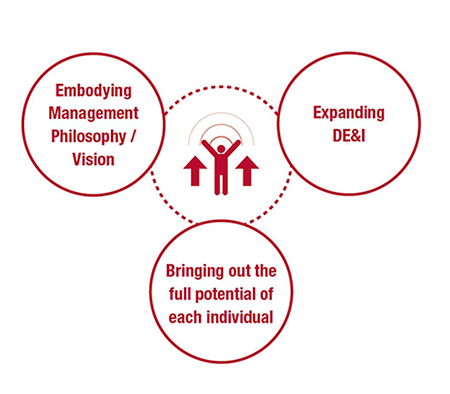Improving the Value of Human Capital (Message from the Officer in Charge of Human Resources)



Masahiko Sawa
July 2025
Growing both our company and the people working in it under our New Action Guideline, aimed at embodying our concept of being “Truly inspired”
Our Fundamental Policy on Human Capital Management
Since our Company was founded, we have placed the highest importance on the belief that “people are capital” and the concept of “People-Centered Management.” In September 1945, shortly after the end of World War II, our founder, Sazo Idemitsu, declared that he would protect his employees, rather than laying them off. He said, “We have lost our business, and we still have debts, but Idemitsu Kosan’s human resources include 800 people working overseas. They are the only capital we have, and it is they who will build our future businesses. At Idemitsu Kosan, we respect human beings, so we must not rush to dismiss our workers amid the postwar chaos.” His belief that any difficulty can be overcome as long as employees grow well has been passed down to this day as a fundamental policy, which includes “never laying off employees for company reasons” and “the purpose of our company is to develop people who serve society and are respected, and business is the means to that end.”
Business Strategy Issues We Face, and Human Capital Strategy
Since being designated as a wholesaler in 1949, our mission has been to support Japan’s energy security, and we have developed our business activities by building a network centered on the fuel oil business both within Japan and abroad. However, the business model of petroleum refining and sales that our predecessors built after World War II is entering a period of major transformation as we move toward achieving carbon neutrality (CN) by 2050. Our current Medium-term Management Plan positions investment in business structure reform and human capital as the wheels on which our vehicle travels, and we aim to create an environment where all employees can maximize their abilities and individuality, with their growth fueling the growth of the company as a whole. To that end, we are promoting a human capital strategy comprising three pillars: (1) Embodying Management Philosophy / Vision; (2) Expanding DE&I; and (3) Bringing out the full potential of each individual. I would like to introduce some examples of our main initiatives here.
●The Three Pillars of Human Capital Strategy



1. Embodying Management Philosophy / Vision
We will use events such as company-wide town hall meetings, which provide a forum for direct dialogue between management— including the president—and employees, to communicate the state of the business, our Management Philosophy, and more, and foster understanding among employees. The Idemitsu Kosan Human Gallery, a venue where people from both inside and outside the Company can learn about our philosophy and history, was also reopened in October 2024 after a major update. Furthermore, we established the New Action Guideline for embodying our Management Philosophy of “Truly inspired,” which will be discussed later.
2. Expanding DE&I
Our Company practices “People-Centered Management,” and it is therefore essential that we create an environment where diverse employees can work and grow together in a vibrant manner. We are focusing our efforts on creating a culture where employees from minority groups, including women, LGBTQ+ individuals, foreign nationals, people with disabilities, and more, can thrive. This includes our cross-mentoring program, which involves pairing employees with mentors from different businesses, as well as initiatives to promote the appointment of female employees in manufacturing settings, with the goal of increasing leadership opportunities for female managers. These efforts have been well-received, as evidenced by our Company receiving the Nadeshiko Brand award for the third consecutive year in 2024.
3. Bringing out the full potential of each individual
In FY2024, we established the Idemitsu Employee Association with the goal of providing a forum where all employees, including managers, can participate in discussions to create a better company and organizational culture. We also established a Career Design Department to support the autonomous career development of our employees, and have started rolling out voluntary training opportunities and tools for employees to consider their lifelong and life-wide career development.
・The Idemitsu Engagement Index
The Idemitsu Engagement Index (Idemitsu EI) is an important goal indicator for achieving sustainable growth through structural reforms of our existing businesses. This proprietary index has been developed by our Company to measure employee commitment to the organization, identify issues, and ensure that thorough measures are taken.
Setting the New Action Guideline and Promoting Understanding
I would like to provide some additional information about the “New Action Guideline” we established in 2025. Our HR System and Action Guideline were formulated with the merger of Idemitsu Kosan and Showa Shell Sekiyu in 2019. Our policy was to launch an entirely new concept, rather than leaning toward the system of either of the original companies. At the time, the new, integrated company had no Management Philosophy to indicate the company’s purpose of existence,value system, and the like, and serve as a foundation for its HR system. Subsequently, in April 2021, we formalized our Management Philosophy of “Truly inspired.”
However, many employees pointed out that the terminology used in the HR system and Action Guideline was too general, and failed to reflect both our company’s values and the type of people we seek to hire. We therefore redefined the Action Guideline as the New Action Guideline to better reflect our company’s unique characteristics. Our Management Philosophy of “Truly inspired” is based on the belief that “the purpose of our company is to develop people who serve society and are respected, and business is the means to that end.” In redefining our New Action Guideline, we articulated what we expect from our employees based on each part of the Management Philosophy, summarized these as seven elements, and organized those elements into three Basic Attitudes, namely a “complete sense of ownership,” a “constant desire for growth,” and “deep regard for sincerity and mutual trust,” and four Competencies, or the ability to “take on new challenges boldly,” “think thoroughly and make confident decisions,” “overcome differences,” and “empower people.”
We place particular importance on the “complete sense of ownership” element of the New Action Guideline. At Idemitsu, we define a “complete sense of ownership” as “Willingness to take ownership of matters in which one is involved, as well as the responsibility for completing them.” Generally speaking, a “sense of ownership” refers to an attitude of taking the initiative to actively engage in work and other matters that one is involved in. However, our “complete sense of ownership” takes this concept a step further; it goes beyond a simple sense of responsibility, and encompasses both a deep passion for the success of individual tasks and overall projects, and a strong awareness that one’s actions affect outcomes directly. This includes, for example, behavior such as encouraging other members even outside the scope of one’s own duties, quietly preventing errors and omissions, and the like to help the organization achieve its overall goals.
Starting with a company-wide briefing in February 2025, we began rolling out measures to promote the understanding and acceptance of the New Action Guideline and its evaluation items throughout the company, including small-scale town hall meetings and roundtable discussions in each department. Each employee taking ownership of the New Action Guideline and thoroughly understanding each item will enable us to embody our Management Philosophy of “Truly inspired,” and through such efforts, we aim to achieve sustainable growth for our employees and, by extension, for the Company as a whole.
●New Action Guideline
| Action Guideline / Evaluation Items | Definitions | |
|---|---|---|
| Basic attitudes | Complete sense of ownership | Willingness to take ownership of matters in which one is involved, as well as the responsibility for completing them |
| Constant desire for growth | Willingness to self-reflect every day, always learning and growing | |
| Deep regard for sincerity and mutual trust | Willingness to empathize with all involved, both inside and outside the Company, offering respect and supporting their potential | |
| Competencies | Take on new challenges boldly | The ability to set high goals and take on challenges, unconstrained by precedent and undeterred by failure |
| Think thoroughly and make confident decisions | The ability to think from a multifaceted perspective, then make timely decisions with confidence and conviction | |
| Overcome differences | The ability to listen and understand another person’s position, then find a workable solution that allows you to move forward | |
| Empower people | The ability to recognize the potential of all people, then leverage their capabilities to the fullest | |